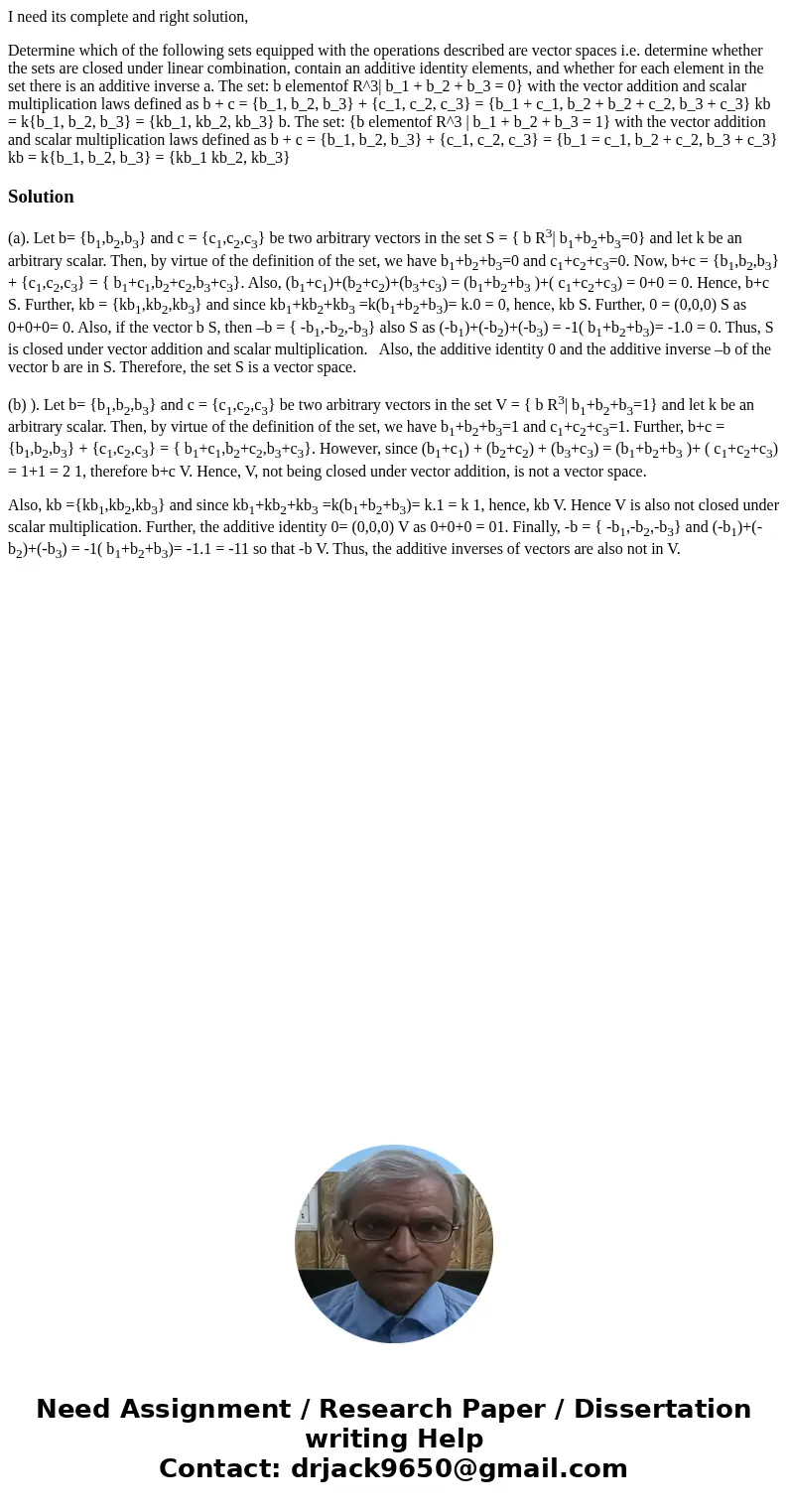I need its complete and right solution Determine which of th
I need its complete and right solution,
Determine which of the following sets equipped with the operations described are vector spaces i.e. determine whether the sets are closed under linear combination, contain an additive identity elements, and whether for each element in the set there is an additive inverse a. The set: b elementof R^3| b_1 + b_2 + b_3 = 0} with the vector addition and scalar multiplication laws defined as b + c = {b_1, b_2, b_3} + {c_1, c_2, c_3} = {b_1 + c_1, b_2 + b_2 + c_2, b_3 + c_3} kb = k{b_1, b_2, b_3} = {kb_1, kb_2, kb_3} b. The set: {b elementof R^3 | b_1 + b_2 + b_3 = 1} with the vector addition and scalar multiplication laws defined as b + c = {b_1, b_2, b_3} + {c_1, c_2, c_3} = {b_1 = c_1, b_2 + c_2, b_3 + c_3} kb = k{b_1, b_2, b_3} = {kb_1 kb_2, kb_3}Solution
(a). Let b= {b1,b2,b3} and c = {c1,c2,c3} be two arbitrary vectors in the set S = { b R3| b1+b2+b3=0} and let k be an arbitrary scalar. Then, by virtue of the definition of the set, we have b1+b2+b3=0 and c1+c2+c3=0. Now, b+c = {b1,b2,b3} + {c1,c2,c3} = { b1+c1,b2+c2,b3+c3}. Also, (b1+c1)+(b2+c2)+(b3+c3) = (b1+b2+b3 )+( c1+c2+c3) = 0+0 = 0. Hence, b+c S. Further, kb = {kb1,kb2,kb3} and since kb1+kb2+kb3 =k(b1+b2+b3)= k.0 = 0, hence, kb S. Further, 0 = (0,0,0) S as 0+0+0= 0. Also, if the vector b S, then –b = { -b1,-b2,-b3} also S as (-b1)+(-b2)+(-b3) = -1( b1+b2+b3)= -1.0 = 0. Thus, S is closed under vector addition and scalar multiplication. Also, the additive identity 0 and the additive inverse –b of the vector b are in S. Therefore, the set S is a vector space.
(b) ). Let b= {b1,b2,b3} and c = {c1,c2,c3} be two arbitrary vectors in the set V = { b R3| b1+b2+b3=1} and let k be an arbitrary scalar. Then, by virtue of the definition of the set, we have b1+b2+b3=1 and c1+c2+c3=1. Further, b+c = {b1,b2,b3} + {c1,c2,c3} = { b1+c1,b2+c2,b3+c3}. However, since (b1+c1) + (b2+c2) + (b3+c3) = (b1+b2+b3 )+ ( c1+c2+c3) = 1+1 = 2 1, therefore b+c V. Hence, V, not being closed under vector addition, is not a vector space.
Also, kb ={kb1,kb2,kb3} and since kb1+kb2+kb3 =k(b1+b2+b3)= k.1 = k 1, hence, kb V. Hence V is also not closed under scalar multiplication. Further, the additive identity 0= (0,0,0) V as 0+0+0 = 01. Finally, -b = { -b1,-b2,-b3} and (-b1)+(-b2)+(-b3) = -1( b1+b2+b3)= -1.1 = -11 so that -b V. Thus, the additive inverses of vectors are also not in V.

 Homework Sourse
Homework Sourse